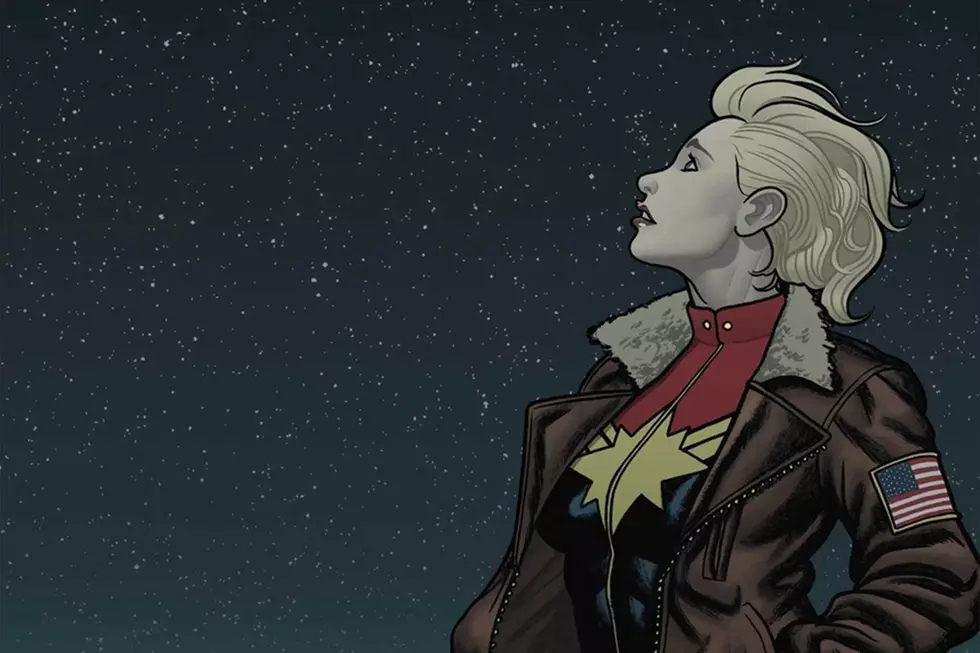
Master Of The Long Game: Celebrating Chris Claremont
Few writers are as inextricably linked to one comics property as Chris Claremont with X-Men. It's understandable why, since he also wrote more X-Men comics than anyone else has even come close to. In addition to a mindblowing 16-year run on Uncanny X-Men, he also wrote New Mutants, Excalibur, Wolverine, and other ancillary X-books. He not only defined the X-Men, pretty much forever, he changed comics with his emphasis on character development, melodrama, and long-game storytelling.
Claremont was born on November 25, 1950, in London, England, but his parents moved to the United States when he was three, and he grew up primarily on Long Island. He was a bookish kid who didn't care for sports, and found prose science fiction more interesting than the comics of the day. He studied acting and political theory at Bard College, and graduated in 1972. But it was before he'd even graduated that he first got a job at Marvel Comics.
As an undergraduate he was a gofer at Marvel, but he soon became an editorial assistant. Although he was given a plot assist credit for 1969's X-Men #59, written by Roy Thomas, his first official scripting job was Daredevil and the Black Widow #102 in 1973. After that he became the writer of Iron Fist, the book where he first collaborated with artist John Byrne. Over the course of his career he also had memorable runs on Ms. Marvel, Marvel Team-Up, and later Fantastic Four. But it was the X-Men that made his name, and whose name he made.
In 1975, Len Wein and Dave Cockrum had revamped the team in Giant-Size X-Men #1, and Wein, also the Marvel Editor-in-Chief at the time, handed the ongoing series over to Claremont, who was only 24. Wein could see how enthusiastic the young writer was about the X-Men, and how many ideas he had. It was inarguably the best decision Wein could have made for the book, and for Marvel, and for Claremont.
It's easy to forget that Wein is the credited co-creator on those new X-Men, because it was Claremont who really made them the characters we remember. Storm and Colossus in particular started out very much like common stereotypes of an African woman and a Russian man, respectively. But Claremont made Storm a former thief whose peaceful demeanor masked a proclivity for violence that slowly emerged after she became the X-Men's leader in the '80s. And Claremont's Colossus was more than just a simple farmer from the collective; he was a sensitive and thoughtful young man who was troubled by violence and aspired to be a painter.
Claremont's tendencies as a writer are embodied in what he did with those characters. Under his stewardship, superhero characters grew and changed and deepened on a level they never had before. In fact, he thought the X-Men should constantly evolve, welcoming new younger members as older ones moved on. So when Cyclops left the team after Jean Grey's death, he never intended for him to permanently return. For that matter, he certainly had no plans to bring Jean back (which is ironic, since he is the one who'd named her the Phoenix).
But comics work the way they work, and if Claremont wasn't going to bring back Scott and Jean, they ended up coming back anyway to become members of X-Factor, the first X-team launched without Claremont. Similarly, he had the X-Men's greatest enemy, Magneto, evolve into a more complex character and eventually an ally for the X-Men and teacher to the New Mutants.
But in comics, things tend to default to the "classic" status quo, and it was eventually mandated that Magneto become a villain again --- until writers who grew up with Claremont's semi-heroic Magneto took him down that path again. This sort of regressive storytelling and meddling by editors contributed to Claremont's departure from the X-Men in 1991, as did the growing power of a new group of artists who would go on to form Image Comics.
Claremont would return to the X-Men over the ensuing years, but it's that initial 16-year run that will always stand as his magnum opus, and --- however much Marvel would love to duplicate it --- the pinnacle of X-Men as a comic. But more than that, his extraordinarily popular style of character-focused forward-looking drama has had an immeasurable impact on all the superhero comics that came after. The narration may be less wordy, but the influence remains.
More From ComicsAlliance
![Unsinkable Ship: All The Girls Love Kitty Pryde (Especially Illyana) [Love & Sex Week]](http://townsquare.media/site/622/files/2017/02/kp_featured.jpg?w=980&q=75)




![What Exactly Was The Deal With Xorn Anyway? [Mutant Week]](http://townsquare.media/site/622/files/2016/05/Xorn-Featured.png?w=980&q=75)
![How Wolverine’s 1982 Mini Series Redefined Everyone’s Favorite Canadian [Mutant Week]](http://townsquare.media/site/622/files/2016/05/Wolverine-Miller.jpg?w=980&q=75)


